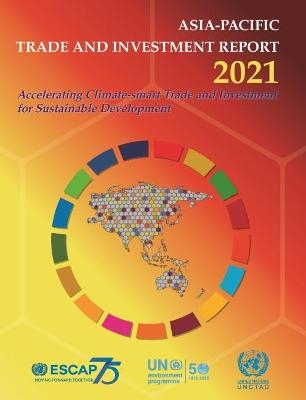
Asia-Pacific trade and investment report 2021
accelerating climate-smart trade and investment for sustainable development
Seiten
2022
United Nations (Verlag)
978-92-1-120832-0 (ISBN)
United Nations (Verlag)
978-92-1-120832-0 (ISBN)
Focuses on how ‘climate-smart’ trade and investment-related policies can help address climate change, taking into account the on-going COVID-19 pandemic. The links between trade, investment and climate change are complex. The key is to ensure that the positive effects of trade and investment are maximized.
International trade and investment have been indispensable engines of economic growth in Asia and the Pacific and remain essential means of implementation for the 2030 Agenda for Sustainable Development. However, this economic growth has come with significant social and environmental costs, including the rapidly worsening climate crisis. This report is focused on how 'climate-smart' trade and investment-related policies can help address climate change, taking into account the on-going COVID-19 pandemic. The links between trade, investment and climate change are complex. The key is to ensure that the positive effects of trade and investment are maximized, such as by promoting trade and investment in renewable energy and low-carbon technologies, while the negative effects are minimized, such as by digitalizing trade and transport systems. Putting a price on carbon and eliminating fossil fuel subsidies remain fundamental elements on which urgent progress need to be made if trade and investment are to become more sustainable. As key trade partners seriously consider putting in place border taxes on carbon to address carbon leakages and loss of competitiveness induced by domestic carbon pricing policies, economies in the region not taking steps towards reducing emissions risk being pushed out of key markets. While implementing climate-smart policies may come at a cost in terms of required additional investments, particularly for emission-intensive sectors and economies, the cost of inaction is far greater. The roll-out of COVID-19 recovery packages may provide opportunities to invest in low-carbon technologies and sectors, opportunities that should not be missed in light of the urgency for action
International trade and investment have been indispensable engines of economic growth in Asia and the Pacific and remain essential means of implementation for the 2030 Agenda for Sustainable Development. However, this economic growth has come with significant social and environmental costs, including the rapidly worsening climate crisis. This report is focused on how 'climate-smart' trade and investment-related policies can help address climate change, taking into account the on-going COVID-19 pandemic. The links between trade, investment and climate change are complex. The key is to ensure that the positive effects of trade and investment are maximized, such as by promoting trade and investment in renewable energy and low-carbon technologies, while the negative effects are minimized, such as by digitalizing trade and transport systems. Putting a price on carbon and eliminating fossil fuel subsidies remain fundamental elements on which urgent progress need to be made if trade and investment are to become more sustainable. As key trade partners seriously consider putting in place border taxes on carbon to address carbon leakages and loss of competitiveness induced by domestic carbon pricing policies, economies in the region not taking steps towards reducing emissions risk being pushed out of key markets. While implementing climate-smart policies may come at a cost in terms of required additional investments, particularly for emission-intensive sectors and economies, the cost of inaction is far greater. The roll-out of COVID-19 recovery packages may provide opportunities to invest in low-carbon technologies and sectors, opportunities that should not be missed in light of the urgency for action
| Erscheinungsdatum | 04.01.2022 |
|---|---|
| Zusatzinfo | col. figs, tables |
| Verlagsort | New York |
| Sprache | englisch |
| Themenwelt | Sozialwissenschaften ► Politik / Verwaltung ► Europäische / Internationale Politik |
| Wirtschaft ► Volkswirtschaftslehre ► Makroökonomie | |
| Wirtschaft ► Volkswirtschaftslehre ► Mikroökonomie | |
| ISBN-10 | 92-1-120832-7 / 9211208327 |
| ISBN-13 | 978-92-1-120832-0 / 9789211208320 |
| Zustand | Neuware |
| Haben Sie eine Frage zum Produkt? |
Mehr entdecken
aus dem Bereich
aus dem Bereich
Studienbuch
Buch | Hardcover (2023)
De Gruyter Oldenbourg (Verlag)
CHF 62,90
erfolgreiche Interessenvertretung durch Prozesskompetenz im komplexen …
Buch | Hardcover (2023)
Wiley-VCH (Verlag)
CHF 58,75


